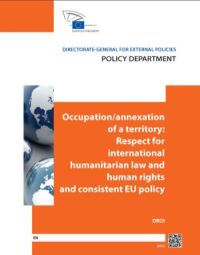Palestine, Crimea, Western Sahara: EU paper seeks coherence

The Policy Department of the European Parliament has published a report on the need for a coherent EU policy with regard to the three occupations of Western Sahara, Palestine and Crimea. In all three cases, plunder is illegal, the report states.
Published 11 April 2016
 At the request of the European Parliament's Sub-Committee for Human Rights, the Policy Department of the European Parliament last year published a report called "Occupation/annexation of a territory: Respect for international law and human rights and consistent EU policy".
At the request of the European Parliament's Sub-Committee for Human Rights, the Policy Department of the European Parliament last year published a report called "Occupation/annexation of a territory: Respect for international law and human rights and consistent EU policy". The report looks into the need for a coherent EU approach with regard to the three occupations of Crimea, Palestine and Western Sahara. At present, the EU displays a manifest lack of consistency on the subject. "While each situation has its own characteristics, the international law governing them is the same. For keeping the European Union's credibility, it is crucial, and therefore necessary, to treat like cases alike", the report reads in its introductory paragraphs on p.13.
"While there is no clear EU policy of non-recognition with regard to Western Sahara, such a policy has developed over time regarding the OPT and is quite clear and consequential in the case of Crimea." (p.46)
Download the report here.
With regard to the EU's obligations vis-à-vis Western Sahara, the report reads that: "As has been stated above with regard to Palestine, all States are under an obligation not to recognise an illegal situation resulting from annexation. They are also under an obligation not to render aid or assistance in maintaining this illegal situation. It is also for States, while respecting the United Nations Charter and international law, to see to it that any impediment, resulting from the annexation, to the exercise by the people of Western Sahara of its right to self-determination is brought to an end". (p.42)
The report goes into the EU's economic agreements with Morocco that are also being applied outside of Morocco's national territory, namely into Western Sahara. "Any agreement with Morocco regarding the waters and territory properly belonging to Western Sahara should be the subject of an arrangement, in which Morocco acts in its capacity as an occupying power. As additional condition, it should be clear that the agreement would benefit the people of Western Sahara (as defined under international law) and be in accordance with the wishes of the people". (p.44) The EU is not doing so at present, the report states.
The report ends with recommendations for the EU institutions to make the emerging policy of non-recognition more coherent. The policy department has listed several recommendations specifically for the European Parliament, including the following;
- "The European Parliament should refuse to give its assent to treaties and other agreements and measures which violate the obligation of non-recognition and/or which support an ongoing illegal occupation or annexation". (.p54)
- "The European Parliament and its Members should regularly ask the Commission and other responsible EU bodies about information regarding the implementation of agreements with - and projects in occupying states, in order to ensure that no illegal occupation or annexation is recognised or supported." (.P.54)
News
EU Court adviser confirms separate and distinct status of Western Sahara
The Advocate General of the EU’s top Court backs the legal status of the people of Western Sahara. Final Judgment expected in a few months.
21 March 2024
EU Court adviser: fruit from Western Sahara should not be labelled as from Morocco
Labelling those products as originating in the Kingdom of Morocco instead of originating in Western Sahara breaches EU law, the Advocate General of the EU Court of Justice concludes.
21 March 2024
COWI abandons future projects in Western Sahara
After undertaking work for the Moroccan state phosphate company in Western Sahara, the Danish consultancy giant COWI states that it “will not engage in further projects" in the occupied territory.
11 March 2024
Report: EU-Morocco fisheries depends on illegal occupation
An external evaluation report on the EU-Morocco fisheries agreement 2019-2023 confirms that the agreement revolves, in its entirety, around Western Sahara.
08 March 2024



